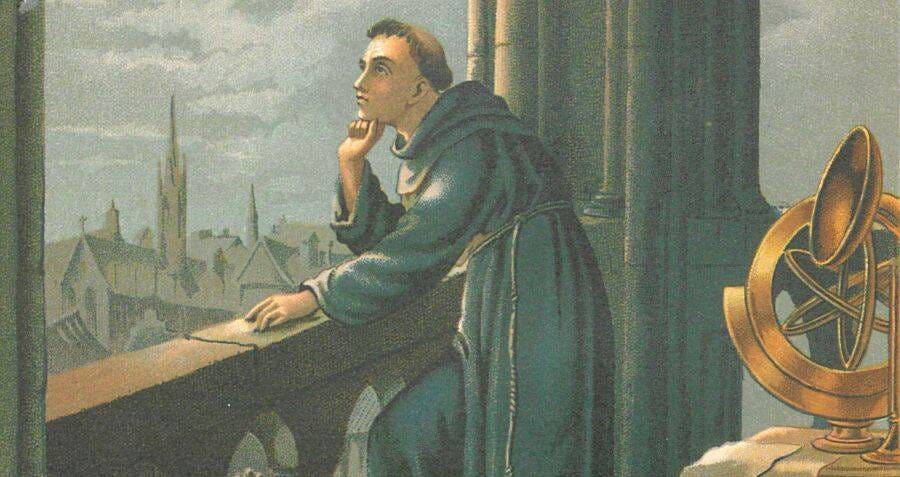Demystifying the "Dark Ages"
The Scientific Inquiry of Medieval Christianity through the Lens of Roger Bacon
The term "Dark Ages" has long been used to describe the medieval period in Europe as a time of cultural and intellectual decline, especially between the fall of the Roman Empire and the beginning of the Renaissance. However, this portrayal is not only simplistic but ultimately incorrect. A closer examination of the period reveals a vibrant culture of scientific inquiry and innovation, deeply intertwined with the religious and philosophical context of the time. One of the most compelling figures in this narrative is Roger Bacon, a medieval scholar whose work on optics and the philosophy of science underscores the era's profound engagement with natural philosophy.
The Myth of the "Dark Ages"
The concept of the "Dark Ages" is largely a construct of Renaissance thinkers, who viewed their time as a rebirth of the classical knowledge and intellectual achievements of ancient Greece and Rome. This perspective, however, overlooks the significant contributions of medieval scholars, who not only preserved much of this ancient wisdom but also expanded upon it in innovative ways. Medieval Christianity, often viewed as antithetical to scientific progress, was, in fact, a rich soil in which the seeds of inquiry and discovery were sown.
The medieval period was marked by significant advancements in various fields, including mathematics, astronomy, and medicine. Universities, the first of which were founded in the 12th century, became centers for scholarly activity, promoting a culture of learning and debate that was deeply influenced by Christian theological thought.
Medieval Christianity and Scientific Inquiry
Contrary to the popular narrative, the relationship between medieval Christianity and science was not one of conflict but of coexistence and mutual enrichment. The Church was a major patron of the sciences, with monasteries and cathedrals serving as important centers of learning and knowledge transmission. Medieval theologians and scholars, many of whom were clergymen, saw the exploration of the natural world as a way to understand and glorify God's creation.
This period witnessed the translation of Greek and Arabic texts into Latin, making the works of Aristotle, Ptolemy, and Avicenna accessible to Western scholars. This influx of knowledge spurred intellectual curiosity and debate within the universities and monastic schools, leading to significant philosophical and scientific developments. Unlike Plato, who saw forms as abstract and separate from physical objects, Aristotle believed that form (the essence of a thing) is embodied in matter (the substance of a thing). To know an object, one must study the object itself, not an abstract form. This empirical approach laid the groundwork for the scientific method, emphasizing observation and experience as the basis for knowledge.
Roger Bacon and the Science of Light
Roger Bacon (c. 1219/1220–1292), also known as Doctor Mirabilis (the "Wonderful Doctor"), epitomizes the scientific spirit of the medieval period. A Franciscan friar, Bacon was deeply versed in the Christian tradition, yet he was also an ardent advocate for the empirical study of nature. His most significant contributions lie in the field of optics, where he studied the properties of light, vision, and the behavior of lenses, which would later influence the development of spectacles and optical instruments.
Bacon was one of the first European scholars to recognize and advocate for the importance of Arabic and Greek scientific works. He understood that many of these works contained advanced knowledge not yet appreciated or understood in Europe. By translating and promoting these texts, Bacon helped reintegrate ancient and foreign scientific knowledge into the Western tradition, enriching European science. This advocacy for the cross-cultural transmission of knowledge underscored the universality of science—a principle that remains relevant today.
Bacon's foresight is perhaps most astonishingly demonstrated in his predictions of future inventions. In his writings, he speculated about the possibility of machines that could fly, undersea boats, and even horseless carriages, envisioning technologies that would not come into existence for centuries. While these speculations were not accompanied by practical blueprints, they reflect Bacon's visionary understanding of science's potential to transform society.
Bacon's work, "Opus Majus," is a testament to the integration of religious belief and scientific inquiry. In it, he argued for the importance of direct observation and experimentation as means to acquire knowledge, anticipating the modern scientific method. Bacon believed that through understanding the natural world, one could come closer to understanding God's creation, a view that resonated with the medieval Christian worldview.
Conclusion
The narrative of the "Dark Ages" as a period of intellectual stagnation is a misrepresentation of the medieval period's complexity and its contributions to the advancement of knowledge. The era was marked by a profound engagement with the natural world, driven by a quest for understanding that was both scientific and spiritual in nature.
Roger Bacon stands as a symbol of this era's intellectual vitality, embodying the synthesis of faith and reason that characterized medieval thought. His work in optics and his broader philosophical contributions reflect the period's rich tradition of inquiry, challenging the misconception of the medieval period as dark and demonstrating the luminous nature of its intellectual pursuits.
The exploration of medieval Christianity's scientific nature, exemplified by figures like Roger Bacon, reveals a period vibrant with intellectual curiosity and innovation. It invites a reevaluation of the narratives that have long overshadowed the achievements of this fascinating epoch in the history of science.
For Further Reading:
James Hannam, God’s Philosophers: How The Medieval World Laid the Foundations of Modern Science, 2009.
Matthew Gabrielle & David M. Perry, The Bright Ages: A New History of Medieval Europe, 2022.







This is a great article. I would love to hear more about Christianity and science. I feel lost sometimes in reconciling the two in today's age with space exploration and nanotechnology (among other things). It can be a challenge at times with my children as well when they ask science related questions.
Looking forward to reading more!